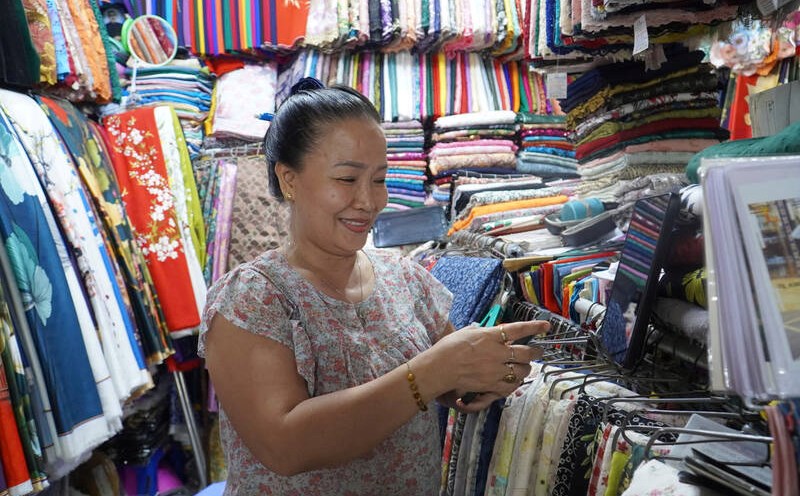From the fear of being worried, I have gradually adapted proactively
In early June, when she started applying electronic invoices from cash registers, Ms. Nguyen Thi Hue - owner of a grocery store on Xuan La Street (Tay Ho, Hanoi) - quietly closed the store. She shared that most of the goods in the warehouse were imported from the unit market or small traders, without input invoices. In the early days of implementing electronic invoices, tax officers were very close to business households. I heard that if the tax party comes to inspect and instruct the goods without the original invoice, the tax will be collected, and the goods will even be confiscated. I have been selling for many years according to the habit, importing goods never requires an input bill, now there are many old goods in warehouse, I don't know where to get an invoice," said Ms. Hue.
After being discussed by local tax officials, she gradually understood better."Tax officials have instructed on how to handle inventory.I was also instructed on how to use software, how to start electronic invoices from money computers...
They also gave the phone number of the responsible staff, so I was assured to resell the products again," said Ms. Hue.Having also fallen into a worried mentality like Ms. Hue, Mr. Pham Van Tan, the owner of a shoe store in Cau Giay district, once considered temporarily stopping sales for fear of being charged a tax or having his goods confiscated.
After the local tax officials went directly to the store to disseminate policies and instructions on the software use process, Mr. Tan gradually overcame his confusion. They asked me how I was selling, then advised me on the simplest way to use software suitable for the retail model. I find the operation not too difficult, the software can print retail invoices according to the general model, he shared.
Currently, Mr. Tan's shop has installed a money computer and issued electronic invoices to customers right at the counter."Before, I thought invoices were a distant thing for a small household like me, now it seems easier to use, more transparent than before, while still controlling revenue," Mr. Tan added.
Tax officials do not check, only guide and support
The transition from avoidance to proactiveness of business households does not come naturally. According to many localities, the flexible approach, close to reality from tax authorities has played an important role in creating trust and solving problems for taxpayers.
At the Tax Department of Region I (Hanoi), in the first week of implementing electronic invoices from cash registers, tax officials went to each business area to focus, directly meeting business households to discuss and answer questions. No documents, no inspection team, just chats at stalls, instructions right on the phone or the available sales equipment of the household.
In an open letter sent to business households on June 17, 2025, the Tax Department of Region I also clearly affirmed its view: "The tax authority does not put pressure or handle administratively business households that are in the process of researching and converting. The goal is to accompany and support, leaving no one behind".
The team of local tax officials is also clearly assigned to people and areas. Many places organize fixed support points at the market, and at the same time establish mobile support groups, coordinate with tax agents and software providers to promptly handle arising situations.
Proper communication - policies will come into life
Mr. Nguyen Quang Huy - CEO of the Faculty of Finance - Banking, Nguyen Trai University analyzed: "The fear of business households is not opposing, but comes from lack of information and fear of mistakes. When they are fully approached, explained in detail, and have a guide, their psychology will change. And once awareness changes, action will change accordingly.
Mr. Huy also noted that traditional, small-scale household groups operating based on experience are subjects that need special attention. Without the right support method, this group can easily be left behind in the transition process. Establishing a support system at the ward and commune levels, classifying households according to job characteristics, readiness levels, and maintaining a two-way feedback mechanism between households and tax authorities will be a key factor to help the policy become a reality.
Sharing the same view, Ms. Le Yen - CEO of Hanoi Tax Consulting Company Limited (Hanoitax) - said that in order for businesses not to feel subject to pressure or punishment, the implementation roadmap needs to be flexible enough, classified according to the level of readiness and accompanied by a reasonable transition time.
Ms. Le Yen also noted that if you want a business household to change its thinking, you cannot just force it with regulations."We need a policy that is soft enough in communication, soft in access, but steadfast in the goal of building a transparent, fair and modern tax system".
On the agency side, information from the Tax Department of Region I (Hanoi): In the spirit of companionship and support, the tax authority is committed to providing complete and timely information related to tax policies and administrative procedures to each business household and individual; coordinating with solution providers to specifically guide how to use electronic invoices generated from cash registers.
In addition, the tax authority will also strictly handle cases of intentional conceal of revenue, dishonest declaration, and violation of tax laws, to ensure fairness and transparency for the entire market.











